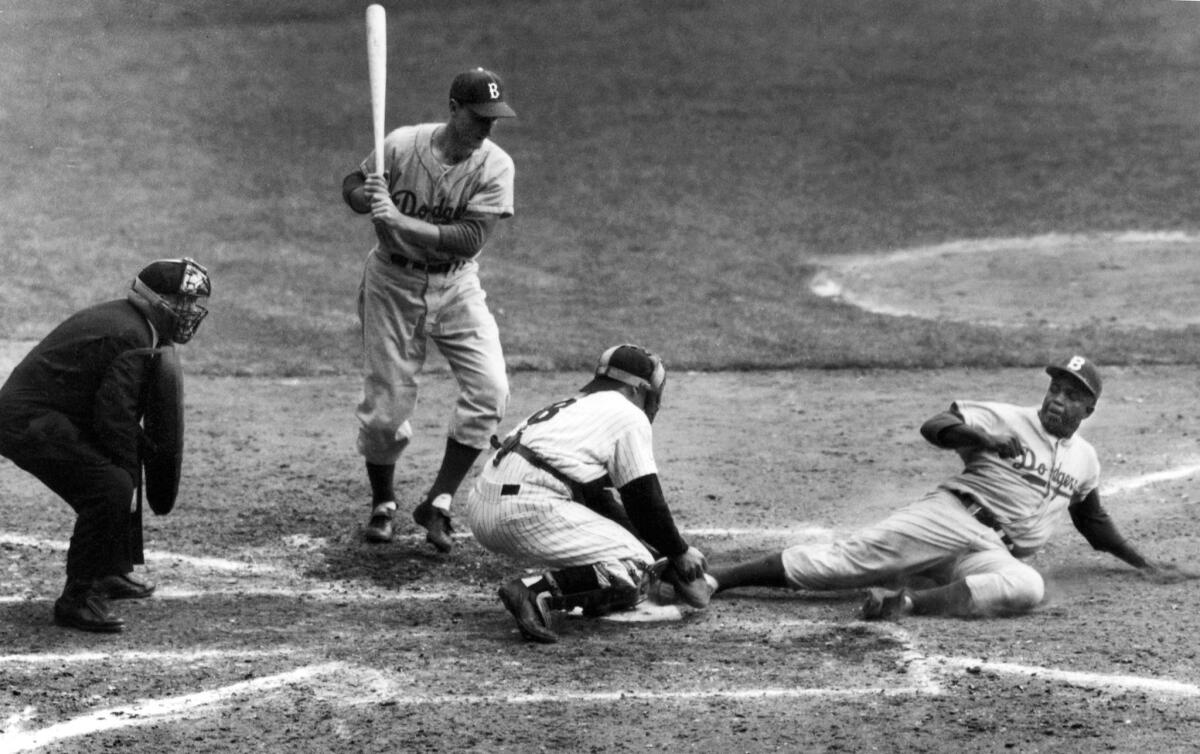‘It ain’t over till it’s over’ and other lessons from Chairman Yogi Berra

In this Sept. 28, 1955, photo, the Brooklyn Dodgers’ Jackie Robinson safely steals home plate under the tag of New York Yankees catcher Yogi Berra in the eighth inning of the World Series opener at New York’s Yankee Stadium. Berra, who played in more World Series games than any other major leaguer and was a three-time American League Most Valuable Player, died Tuesday at the age of 90.
- Share via
“Any word you have to hunt for in a thesaurus is the wrong word,” Stephen King has written. “There are no exceptions to this rule.” I found this quote today on Twitter, where I had gone to read about the superior New York Yankees catcher Yogi Berra, who died Tuesday night in New Jersey at the age of 90.
Berra was a poet in his own way, which is one of the reasons I loved him: plain-spoken and disarmingly on point. He never used a five-dollar word when a nickel word would do, and some of his pronouncements -- “the future ain’t what it used to be,” “never answer an anonymous letter,” “when you come to a fork in the road, take it” -- contain a sneaky sort of wisdom, the wisdom of experience.
My favorite of his sayings may be this one: “How can you think and hit at the same time?” On the surface, it seems to speak to the stereotype that sports has nothing to do with intelligence, but in fact it’s saying completely the opposite.
Berra was no dummy, despite his affable humor and goofy name. He understood, as all great artists have, that thinking often gets in the way of creation, that the more we ruminate, the less we may be able to do.
Hitting, like writing, is a matter of being in the moment; the first and most important act is to get out of our own way. The brainiest players -- not unlike the brainiest writers, painters, musicians -- often think themselves into inaction, breaking down every aspect of their style, their approach, until they lose connection to the flow.
Berra was also an author, after a fashion; he wrote, or put his name on, plenty of books, beginning with 1961’s “Yogi: The Autobiography of a Professional Baseball Player.” At the same time, his life -- or at least his career -- highlights why writing about baseball is such a high-risk enterprise.
Berra, after all, was an unlikely athlete: 5-foot-7, 185 pounds, he got his nickname as a teenager because he resembled a yogi, or so the story goes. He was a notorious bad ball hitter, reaching for pitches outside the strike zone, and yet he won the American League MVP award three times, and played on 10 world championship teams and 14 pennant winners (both major league records) in the course of his 19-year career.
You couldn’t make this up, in other words, which is the problem with so much baseball fiction. (Nonfiction is a somewhat different game.) The sport itself is so uncommon, filled with so many unexpected -- and frankly unbelievable (Bill Buckner or Kirk Gibson, anyone?) -- turns, that in a novel, they could not help but seem contrived.
Last week, for instance, when I was in New York, people were abuzz about this year’s Mets (a team Berra managed to the 1973 World Series) -- who are making an improbable playoff run. They were coming off a series in which they had won three straight come-from-behind victories on the road against the second-place Washington Nationals, including a game in which they were losing 7-1 going into the 7th inning.
Even Yankees fans, myself included, are pulling for them, and I have never rooted for the Mets in my life. Try putting that in a novel: It would seem so pat, like something out of a John R. Tunis book for boys, the saga of the underdog avenged.
Berra was that underdog, although there was nothing for which he needed vengeance; he lived an exemplary athletic life. When George Steinbrenner fired him as Yankees manager 16 games into the 1985 season, he calmly but firmly refused to have anything further to do with the team. Fourteen years later, they reconciled -- on Berra’s terms. Quiet dignity, in other words, which has also largely disappeared from professional sports.
Berra’s most famous turn of phrase was probably “It ain’t over till it’s over” -- another deceptively simple statement of depth. What he meant was that we need to stay aware, to stay focused, and most important, not to give up. Stand for your values, stand up for yourself.
When was the last time an athlete made you feel that way?
Twitter: @davidulin
More to Read
Sign up for our Book Club newsletter
Get the latest news, events and more from the Los Angeles Times Book Club, and help us get L.A. reading and talking.
You may occasionally receive promotional content from the Los Angeles Times.







